2023 ISSG Prize Winners Announced!
Congratulations to the 2023 ISSG Prize Winners and Honorable Mention Recipients:
Trevor Kodzis, winner of the 28th annual ISSG Queer Studies Award for their winning essay, “Policing Queer Spaces in Porfirian Mexico City.”
Emma Press, winner of the 15th annual ISSG Women's and Gender Studies Award for their winning essay, “Reality TV’s Woke Efforts in Post-BLM America: The Emergence and Exploitation of the ‘Forgiving Educator’.”
Ari Yao, winner of the 6th annual ISSG Feminist to the Core Essay Award for their winning essay, “Poem 25, "Vanished": The Queer Spacetime of the Beloved in Ibn ‘Arabī’s Tarjumān."
Larkin White, honorable mention recipient of the ISSG Queer Studies Award for their essay, “Flaunting Pure Beauty: Transfemme Epistemology in Jackie Curtis' Vain Victory.”
Mira Mason, honorable mention recipient of the ISSG Women’s and Gender Studies Award for their essay, “He Isn’t “‘Charley’s Aunt’: Julian Eltinge and Female Impersonation On Stage and On Screen.”
Daniel Wolf Shneider, honorable mention recipient of the ISSG Feminist to the Core Essay Award for their essay, “Painting While Naked: Representations of Homosexuality and Masculine Body Anxiety in Early Modern Literature”
We interviewed the students to learn more about their work and their plans for the future.
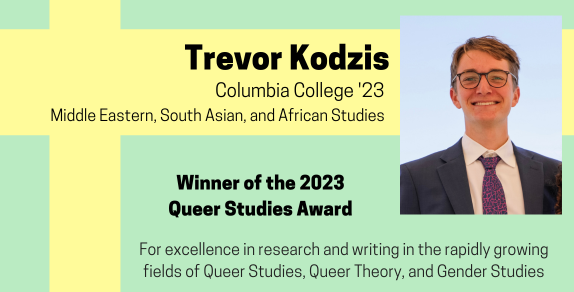
Trevor Kodzis, winner of the 28th annual ISSG Queer Studies Award for their winning essay, “Policing Queer Spaces in Porfirian Mexico City.”
- What inspired you to focus on your topic for this submission?
My inspiration for this essay was actually a movie that I watched on Netflix called El baile de los 41 (Dance of the 41). The events from the film fit perfectly within the parameters of a course I was taking called Urban Crime and Policing in Latin America, and I was really intrigued by this idea that queerness was conceived as an urban elite "construction" by the larger Mexican populace at the turn of the century. The Dance of the 41, was one of the first times homosexuality was discussed publicly in Mexico, and I thought it would be interesting to contextualize this event with urban development projects of the same time.
- How have you been able to integrate your interest in Gender and Sexuality Studies in the work you have done here at Columbia/Barnard?
I would say that I have been able to address gender and sexuality in most classes that I have taken at Columbia. My major is Middle Eastern, South Asian, and African studies, and most of my courses have incorporated critical theory and post-colonial theory which overlap to a great extent with queer and feminist theory and issues.
- What are your plans for the future?
After graduation, I will pursue a Master in City Planning at the Massachusetts Institute of Technology.
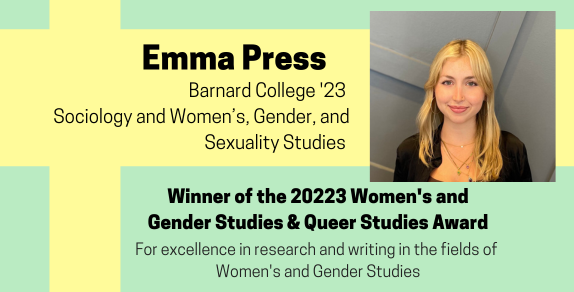
Emma Press, winner of the 15th annual ISSG Women's and Gender Studies Award for their winning essay, “Reality TV’s Woke Efforts in Post-BLM America: The Emergence and Exploitation of the ‘Forgiving Educator’.”
- What inspired you to focus on your topic for this submission?
I felt compelled to use reality TV as a sociological tool because of the massive, growing influence reality shows and their stars have on society, and particularly on my generation. As an avid reality TV fan myself, I started to notice that some reality shows were beginning to address social inequities in a way that they had never done prior. That led me to exploring this changing social landscape within reality TV, how audiences are reacting to it, and how this may reflect larger ideological shifts regarding race and gender in society.
- How have you been able to integrate your interest in Gender and Sexuality Studies in the work you have done here at Columbia/Barnard?
Gender and Sexuality Studies, and particularly Black feminist theory, have transformed my perspective when I approach any subject, text, or concept. It has taught me to look at things with a critical, intersectional lens, and has truly changed the way I engage with the world around me. I try to infuse these teachings into all of my work, and to reflect on how my own positionality influences my outlook and the work that I create.
- What are your plans for the future?
I am interested in pursuing a career in holistic healthcare. I am taking a year off from school and then I’m hoping to pursue a doctorate in Acupuncture and Chinese Herbal Medicine.
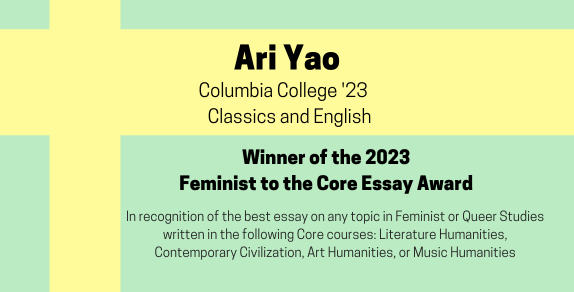
Ari Yao, winner of the 6th annual ISSG Feminist to the Core Essay Award for their winning essay, “Poem 25, "Vanished": The Queer Spacetime of the Beloved in Ibn ‘Arabī’s Tarjumān."
- What inspired you to focus on your topic for this submission?
As I experienced reading the Tarjumān for the first time through Michael Sells’ 2021 translation, I was struck by Ibn ‘Arabi’s expansive way of expressing gender and sexuality. His collection of poetry, known in English as The Translator of Desires, not only partakes in an Arabic literary tradition that discusses the beloved as a plural “they,” but also shapes its own modes of conveying desire (and desirability) through a language of fluidity—an unstable, limitless conception of how someone can inhabit spacetime. Ibn ‘Arabi’s poetry spoke to me because I believe his work can inform current discussions of what it means to imagine queer temporalities, and to transform our ideas of living beyond normative bounds.
- How have you been able to integrate your interest in Gender and Sexuality Studies in the work you have done here at Columbia/Barnard?
Being a prospective Classics and English major at Columbia College, I enjoy looking at literature through perspectives rooted in Gender and Sexuality Studies. Actively taking a queer approach to ‘canonical’ literary traditions has changed my own ways of writing and conversing, as well as navigating my everyday life.
- What are your plans for the future?
I would like to continue writing—both in academic and creative settings—not only to elevate queer voices, but also to explore interdisciplinary ways of working with literary methodologies, genres, and traditions.
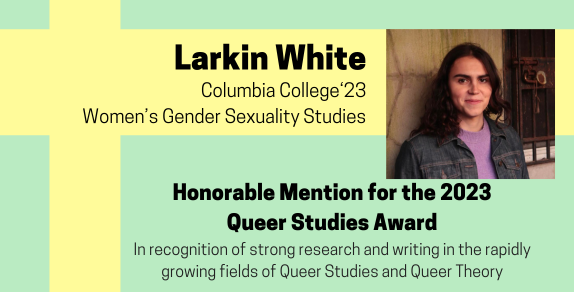
Larkin White, honorable mention recipient of the ISSG Queer Studies Award for their essay, “Flaunting Pure Beauty: Transfemme Epistemology in Jackie Curtis' Vain Victory.”
- What inspired you to focus on your topic for this submission?
Last year, I had the privilege of serving as a research assistant for Che Gossett and spent many hours transcribing oral history interviews about drag queens and trans women in Manhattan’s art scene in the 70s and 80s. In one such interview, performance artist and activist Agosto Machado described a play he had acted in called Vain Victory, written and directed by Jackie Curtis. I knew a little about Curtis from my ongoing search for transfeminine role models across history, but was unfamiliar with and excited by her work. I was inspired to make the play’s script the subject of my writing for Feminist Theory with Marisa Solomon last spring, who in my recognition for this award I am indebted to for her teaching and extensive feedback. My essay is about what made Vain Victory a distinctly transfemme creative work, reflected through my own experience of how cis white men take themselves way too seriously, yet rarely take me seriously at all.
- How have you been able to integrate your interest in Gender and Sexuality Studies in the work you have done here at Columbia/Barnard?
At the end of my sophomore spring I realized that every essay I had written that year was about gender and/or sexuality and I accepted the inevitable: majoring in WGSS [I’m gay]. I am happy to say that since then I have easily been able to make being queer and trans the biggest part of my personality in and outside of the classroom. I have had a wonderful experience learning from my brilliant peers and professors at Barnard and Columbia. I have particularly appreciated the way that I have been encouraged to draw from my own experiences and write and think creatively–it has drastically improved both my critical thinking skills and sense of self.
- What are your plans for the future?
I plan to stay in New York City where ideally I would like to work directly with queer and trans community members through a nonprofit or legal organization.
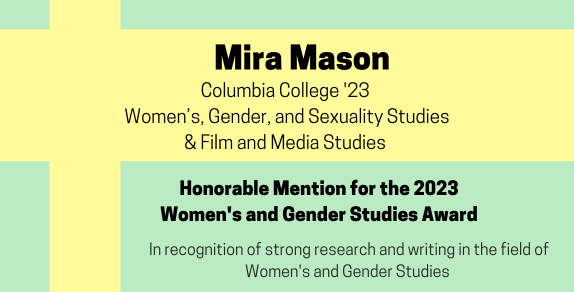
Mira Mason, honorable mention recipient of the ISSG Women's and Gender Studies Award for their essay, “He Isn’t “Charley’s Aunt”: Julian Eltinge and Female Impersonation On Stage and On Screen."
- What inspired you to focus on your topic for this submission?
I first learned about Julian Eltinge taking Gender History and American Film with Professor Hillary Anne Hallett. The readings we read about representations of gender in the films of the 1920's made note of the number of famous actresses and successful films that engaged in female crossdressing, at one point or another. But Julian Eltinge, and male crossdressing in general, was only mentioned in passing. Since there are very few examples of men crossdressing as women in American history, I wanted to know more about the apparently famous male crossdressers of the 1920's, so that's how I ended up with my topic!
- How have you been able to integrate your interest in Gender and Sexuality Studies in the work you have done here at Columbia/Barnard?
As a Gender Studies and English double major, I've found that most of the classes I've taken have been open-ended enough to allow me to incorporate and explore my interest in gender and sexuality. Of course, gender and sexuality are the main attraction in the classes I've taken for the Gender Studies major. But even in the English classes I've taken, the texts I've encountered have been rich enough and the essay prompts flexible enough for me to incorporate my other academic interests into my writing.
- What are your plans for the future?
This summer, I'll be continuing my research on Julian Eltinge as a member of the Humanities Scholars Research Program. Next year, I'm excited to study abroad at Oxford in the Spring semester!
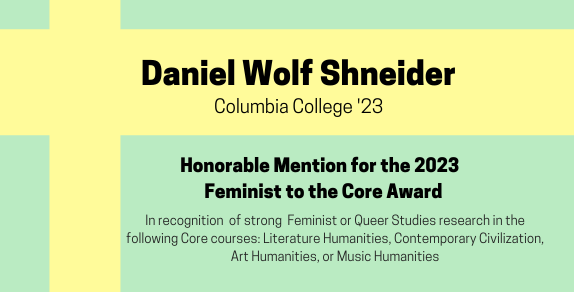
Daniel Wolf Shneider, honorable mention recipient of the ISSG Feminist to the Core Essay Award for their essay, “Painting While Naked: Representations of Homosexuality and Masculine Body Anxiety in Early Modern Literature.”
